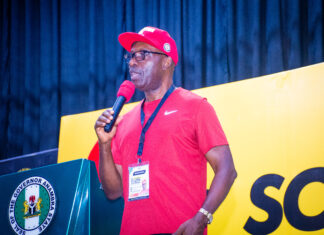It is not unusual at moments of uncertainty or when a situation overwhelms a people for them to ask, who will save us?
By Emeka Alex Duru
It is not unusual at moments of uncertainty or when a situation overwhelms a people for them to ask, who will save us? The Psalmist in Chapter 121, puts it thus; “where does my help come from”? And answers; “My help comes from the Lord, the Maker of heaven and earth”.
In Nigeria, the assurance is lacking. Such situation underscores the level of despondency in a people. Citizens in rural communities, cities and many parts of the country are presently at this point of helplessness. Insecurity has boxed them to the corner. Government, at all levels, is practically on vacation and the people are left on their own. It has got to the point of every man to himself, God for all. When a system degenerates to such state, danger looms.
The Thursday, March 7 invasion of Government Secondary School and LEA Primary School at Kuriga, Kaduna State in which over 280 pupils and teachers, were abducted by bandits, has again exposed the parlous security situation in the country.
The bandits reportedly invaded the Kuriga area of the Chikun Local Government Area of Kaduna State on the fateful day, shooting at random before taking away the pupils and their teachers.
The incident occurred barely 24 hours after insurgents abducted 200 internally displaced women in Borno State. A week earlier, bandits had invaded Gonin-Gora, equally in Chikun LGA, Kaduna and abducted 16 people. The abductors are demanding 40trillion Naira, 11 Hillux Toyota Vans and 150 motorcycles to release the captives.
The question therefore, is ‘where is the government in all these’? Making such enquiry is not being unpatriotic, after all, the primary function of government is guaranteeing the welfare and security of the people and their property. But that is not the case, here. Since the students and their teachers were taken in, not much, if any action, is coming out from Kaduna state or federal government. It is only an offer by a Muslim cleric, Sheikh Ahmad Gumi to dialogue with bandits for their release, that is giving a glimmer of hope on the students.
READ ALSO:
From the East, came a report on a lawyer in Enugu State, Eli Ugwu was shot dead in Kogi State shortly after delivering ransom to kidnappers who abducted his cousin. There have been different versions on how Ugwu met his death. One account alleges that he was killed by the hoodlums after collecting the ransom from him. Another angle of the story has it that Ugwu was shot dead by policemen as he was coming out of the bush, alongside his cousin upon his release by the kidnappers.
Whatever is the explanation for his gruesome exit, Ugwu should not have died in that manner, if the state was up to its responsibilities to the people. It was not for him to have gone negotiating for the release of his kidnapped cousin if the various law enforcement and intelligence agencies were alive to their duties.
But that is Nigeria for you. When concerned analysts express the fears that the country is fast drifting to a failed state, the government is easily rattled and dismisses people holding such views as pessimists who do not mean well for the system. The facts are however that the country is being pushed to the edge every day. When a state is unable to provide its citizens with basic political good in terms of security, basic health care, infrastructure, law and order, education and conducive environment for their businesses to thrive, it has practically failed. Nigeria is in that class, now.
In 2016, the United Nations (UN) raised alarm on the proliferation of Small Arms and Light Weapons (SALW) in Nigeria. According to the alert, over 350 million of estimated 500 million of such weapons circulating in the West African sub-region were domiciled in the country. The illegal weapons, UN noted, had found their way into unauthorized hands and non-state actors thus constituting huge threats to the existence of the country and the people. The warning was supposed to make the authorities take actions against the menace.
But eight years after, the situation has not changed. It has rather worsened. In fact, to state that Nigeria’s current security profile is piteous, is perhaps, an understatement. It is literally flat on its back, offering uncertain hopes in the immediate future.
Since April 2014, when 276 schoolgirls were kidnapped from a government secondary school in Chibok, in Borno State; through February 19, 2018, when 110 students aged 11–19 years old were abducted from the Government Girls’ Science and Technical College (GGSTC), Dapchi, Yobe State and December 11, 2020, when over 300 pupils were kidnapped from a boys’ secondary boarding school on the outskirts of Kankara, Katsina State, to the present Kaduna episode, Nigerians have been at the mercy of hoodlums, without any reasonable answers from the government.
So, when the Presidency seeks to blame the recent cases of kidnapping across the country on sub-regional geopolitical forces conspiring to undermine the government of President Bola Tinubu, it needs to assure Nigerians that it is on top of the situation.
Governance is not about buck-passing or blame game. On his inauguration, Tinubu told Nigerians that he understood their problems and pledged to tackle them headlong. He also asked that nobody should sympathise with him on the magnitude of work before him. It is such situations which Tinubu claimed to have envisaged, that are presently on the table.
So far, the President and his team have not done much in addressing the challenges in the land. In his nine months in office, Tinubu has used the greater part of the period, blaming his predecessor and opposition, while things continue getting worse than he met them. That is not what his supporters voted him for. They need action, they need governance, they need a feel of the axiomatic dividends of democracy, not the litany of complaints and lamentations that the president feeds them on.
Getting it right on security, requires thinking out of the box. It won’t be a bad idea for Tinubu taking advice from experts on intelligence and insurgency on how to go about the issue, rather than relying on sycophantic aides.
Former Head of State, General Yakubu Gowon, the other day, identified porous nature of Nigeria’s borders as a contributing factor to the country’s security challenges. That is a lead to be explored. Statistics indicate that Nigeria has international land borders of about 4,470 km (2,513 miles) with Chad Republic, Cameroon, Benin and Niger and a coastline of 774km which are largely unmanned.
A 2018 data from the Nigerian Immigration Service (NIS) equally showed that there were about 1,500 identified land border crossings into the country, with only 114, covering 4,000 square kilometres, approved control posts manned by merely 23,000 Immigration Officials and other security agencies. These vulnerable routes are exploited by mischievous minds to import arms into the country.
Policing these porous borders, providing good governance, creating jobs for the youths, will go a long way in reducing the tide of insecurity in the country.













